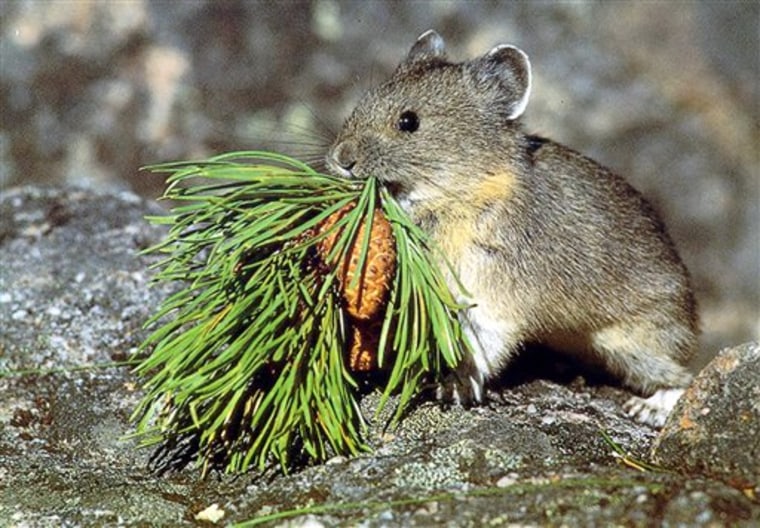Federal officials have decided not to provide endangered species protections to the American pika, a tiny mountain-dwelling animal thought to be struggling because of warming temperatures.
The U.S. Fish and Wildlife Service was scheduled to announce the decision Friday.
A copy of the decision listed on a federal Web site on Thursday says while some pika populations in the West are declining, others are not. The agency says Endangered Species Act protections are not warranted.
The activists who had sued to try to get a listing blasted the Obama administration.
“This is a political decision that ignores science and the law,” Shaye Wolf, a biologist with the Center for Biological Diversity, said in a statement. “Scientific studies clearly show that the pika is disappearing from the American West due to climate change and needs the immediate protections of the Endangered Species Act to help prevent its extinction. The Interior Department has chosen to sit on its hands instead of taking meaningful action to protect our nation’s wildlife from climate change.”
A furry, big-eared relative of the rabbit, pikas live mostly in high, rocky mountain slopes in 10 Western states.
Temps above 78 can be deadly
It is well-suited for alpine conditions, with dense fur, slow reproductivity and a thermal regulation system that doesn't do well in the heat. Even brief exposure to temperatures of 78 degrees or warmer can cause death.
As the West warms, scientists say some pikas have tried to move upslope to find cooler refuges but have run out of room.
Environmentalists had petitioned the federal government to protect the species.
"The pika is the fire alarm and this is our opportunity to come to grips with global warming and prevent an extinction crisis," said Greg Loarie, an attorney with the Earthjustice law firm who has worked on pika lawsuits pressing for protections.
The Bush administration listed the polar bear as a threatened species in 2008, the first and so far only species to be protected because of the threats of global warming. But it also issued a rule stating that the Endangered Species Act may not be used to require reduced greenhouse gas emissions.
Last May, the Obama administration reaffirmed that exemption. The Center for Biological Diversity, the Natural Resources Defense Council and Greenpeace are fighting that rule in court.
The pika lives in parts of California, Colorado, Idaho, Montana, Nevada, New Mexico, Oregon, Utah, Washington and Wyoming.
Group: Obama slower than Bush
A study in 2003 found six of 25 previously known pika populations in the West's Great Basin watershed had disappeared, primarily because of the effects of warming temperatures.
Wolf said subsequent studies indicate other populations in the Great Basin have disappeared.
Wolf's group also criticized the Obama administration for its overall policy on listing species for protection.
"Last year, the Obama administration denied listing to the spotted seal off Alaska despite the rapid melting of its sea-ice habitat; it also upheld the Bush administration’s decisions to deny listing to the climate-change-imperiled ribbon seal and emperor penguin," it stated. "During its first year in office, the Obama administration listed only two species under the Endangered Species Act, compared to an average of eight species per year under Bush and 65 species per year under Clinton."
